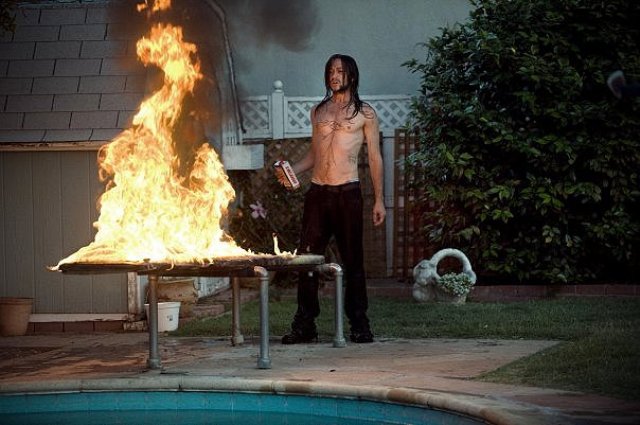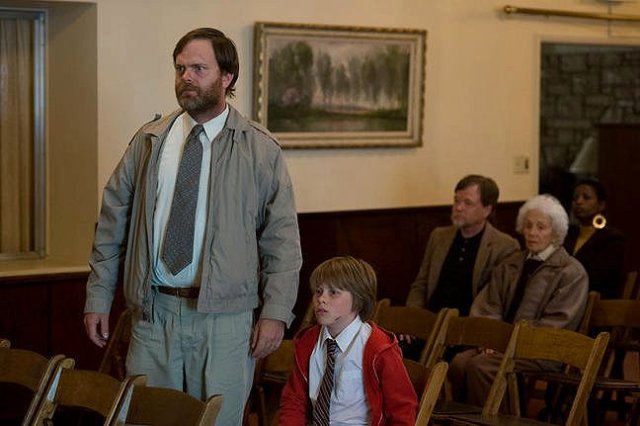CHICAGO – In anticipation of the scariest week of the year, HollywoodChicago.com launches its 2024 Movie Gifts series, which will suggest DVDs and collections for holiday giving.
Loathsome ‘Hesher’ With Joseph Gordon-Levitt, Natalie Portman
 Rating: 1.0/5.0 |
CHICAGO – “Hesher” ends with a middle finger and I shot one right back to the screen. Rarely has a film so completely misunderstood the grieving process and played faux tough in an attempt to be edgy instead of heartfelt. Like a knock-off of Chuck Palahniuk produced by people raised only on Sundance films, “Hesher” is a mess.
It hurts me to say so. Stars Joseph Gordon-Levitt and Natalie Portman deserve mention in any conversation of the best actors of their generation and I generally love what they do. There was no bigger champion of “Black Swan” than this critic and JGL has been underrated for years, giving great performances in “Brick,” “The Lookout,” “(500) Days of Summer,” and more. Co-stars Rainn Wilson and Piper Laurie are also commonly effective.

Hesher
Photo credit: Newmarket Films
There’s nothing effective about “Hesher” unless the effect you’re looking for is anger. Filmmaker Spencer Susser (who also co-wrote) makes a film that argues that the stasis of depression can only be burst with aggression. If you’re being bullied, fight back. If you’re overcome by grief, commit an act of violence. If your mom died, get over it. If life gives you lemons, make piss-filled lemonade.
T.J.(Devin Brochu) has been handed a raw deal by life. His mom died in a horrible car accident (the opening scene features T.J. trying to stop the mangled car from being impounded). His dad (Rainn Wilson) sits around all day in his underwear, alternating pill-popping with sleeping. Both take T.J.’s sweet grandmother (Piper Laurie) for granted. And T.J. regularly gets the crap beat out of him at school. Then Hesher (Gordon-Levitt) appears.
And I do mean APPEARS. The title character falls into T.J.’s life so abruptly, appearing in his house and openly smoking in a school hallway, that it would be easy to think that he was a Tyler Durden-esque figment of our protagonist’s imagination. Listening to Motorhead, driving a creepy van, terrorizing everything in path, and swearing like he needs to in order to live, Hesher is a force of nature – the kind of abrasive, aggressive jerk that will likely get himself killed one day after picking the wrong fight. But he’s just what a grieving kid needs, right?

Hesher
Photo credit: Newmarket Films
No. There’s such a vile underlying message to “Hesher” in that it’s basically saying that grief is for wussies. It’s OK for a young kid to want his mom back. It’s OK for a husband to grieve the loss of his life. We don’t all need a shirtless punk to get us back on the right track.
And, worst of all, “Hesher” wants to be unsentimental – and thinks the way to do so is through f-bombs and destructive behavior – but, ultimately, fall victim to the very traps of the grief melodrama. The final act of “Hesher” is JUST as manipulative as the junk its filmmakers think they’re deconstructing. In other words, it’s hypocritical.
To be fair, Gordon-Levitt isn’t bad here and he makes it out unscathed but he’s playing a plot device, a character who, like all of them doesn’t feel real. And what of Portman? The lovely Oscar winner returns to her “Garden State” roots playing a pretty dorky girl who T.J. finds himself obsessed with and, of course, Hesher follows.
The idea that we need to find a primal, dark side to escape from the pit of despair is not an awful one. In fact, it’s been the theme of quality fiction and film before – that one needs to take drastic action when one is in a drastic situation. But it’s a theme that requires an understanding of both the pain and the solution; both the depression and the aggression. “Hesher” is ALL aggression. I’d rather be depressed.
 | By BRIAN TALLERICO |


